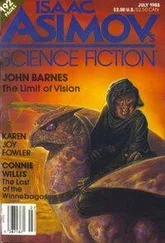The fact that they picked off people with their heat rays, sucked human blood, and spewed poisonous black smoke over entire counties would seem to contraindicate poetic sensibility, but look how poets act. Take Shelley, for instance, who went off and left his first wife to drown herself in the Serpentine so he could marry a woman who wrote monster movies. Or Byron. The only people who had a kind word to say about him were his dogs. 23 Take Robert Frost. 24
The Martians’ identity as poets is corroborated by the fact that they landed seven shells in Great Britain, three in the Lake District, 25 and none at all in Liverpool. It may have determined their decision to land in Amherst.
But they had reckoned without Dickinson’s determination and literary technique, as Number 186B makes clear. 26 Stanza Two reads:
I wrote a letter—to the fiends—
And bade them all be—gone—
In simple words—writ plain and clear—
“I vant to be alone.”
“Writ plain and clear” is obviously an exaggeration, but it is manifest that Dickinson wrote a note and delivered it to the Martians, as the next line makes even more evident:
They (indecipherable) 27 it with an awed dismay—
Dickinson may have read it aloud or floated the note down to them in their landing pit in her usual fashion, or she may have unscrewed the shell and tossed it in, like a hand grenade.
Whatever the method of delivery, however, the result was “awed dismay” and then retreat, as the next line indicates:
They—promptly took—their leave—
It has been argued that Dickinson would have had no access to writing implements in the graveyard, but this fails to take into consideration the Victorian lifestyle. Dickinson’s burial attire was a white dress, and all Victorian dresses had pockets. 28
During the funeral, Emily’s sister, Lavinia, placed two heliotropes in her sister’s hand, whispering that they were for her to take to the Lord. She may also have slipped a pencil and some Post-its into the coffin, or Dickinson, in the habit of writing and distributing notes, may simply have planned ahead. 29
In addition, grave poems 30 are a well-known part of literary tradition. Dante Gabriel Rossetti, in the throes of grief after the death of his beloved Elizabeth Siddell, entwined poems in her auburn hair as she lay in her coffin. 31
However the writing implements came to be there, Dickinson obviously made prompt and effective use of them. She scribbled down several stanzas and sent them to the Martians, who were so distressed at them that they decided to abort their mission and return to Mars.
The exact cause of this deadly effect has been much debated, with several theories being advanced. Wells was convinced that microbes killed the Martians landed in England, who had no defense against Earth’s bacteria, but such bacteria would have taken several weeks to infect the Martians, and it was obviously Dickinson’s poems which caused them to leave, not dysentery.
Spencer suggests that her illegible handwriting led the Martians to misread her message and take it as some sort of ultimatum. A. Huyfen argues that the advanced Martians, being good at punctuation, were appalled by her profligate use of dashes and random capitalizing of letters. S. W. Lubbock proposes the theory that they were unnerved by the fact that all of her poems can be sung to the tune of “The Yellow Rose of Texas.” 32
It seems obvious, however, that the most logical theory is that the Martians were wounded to the heart by Dickinson’s use of near-rhymes, which all advanced civilizations rightly abhor. Number 186B contains two particularly egregious examples: “gone/alone” and “guests/dust,” and the burnt hole in 272? may indicate something even worse.
The near-rhyme theory is corroborated by H. G. Wells’s account of the damage done to London, a city in which Tennyson ruled supreme, and by an account of a near-landing in Ong, Nebraska, recorded by Muriel Addleson:
We were having our weekly meeting of the Ong Ladies Literary Society when there was a dreadful noise outside, a rushing sound, like something falling off the Grange Hall. Henrietta Muddie was reading Emily Dickinson’s “I Taste a Liquor Never Brewed,” out loud, and we all raced to the window but couldn’t see anything except a lot of dust, 33 so Henrietta started reading again and there was a big whoosh, and a big round metal thing like a cigar 34 rose straight up in the air and disappeared.
It is significant that the poem in question is Number 214, which rhymes 35 “pearl” and “alcohol.” 36
Dickinson saved Amherst from Martian invasion and then, as she says in the final two lines of 186B, “rearranged” her “grassy bed— / And Turned—and went To sleep.” She does not explain how the poems got from the cemetery to the hedge, and we may never know for sure, 37 as we may never know whether she was being indomitably brave or merely crabby.
What we do know is that these poems, along with a number of her other poems, 38 document a heretofore unguessed-at Martian invasion. Poems 186B and 272?, therefore, should be reassigned to the Very Late or Deconstructionist Period, not only to give them their proper place as Dickinson’s last and most significant poems, but also so that the full symbolism intended by Dickinson can be seen in their titles. The properly placed poems will be Numbers 1775 and 1776, respectively, a clear Dickinsonian reference to the Fourth of July 39 , and to the second Independence Day she brought about by banishing 40 the Martians from Amherst.
NOTE: It is unfortunate that Wells didn’t know about the deadly effect of near-rhymes. He could have grabbed a copy of the Poems , taken it to the landing pit, read a few choice lines of “The Bustle in a House,” and saved everybody a lot of trouble.
1 For a full account, see H. G. Wells, The War of the Worlds , Oxford University Press, 1898.
2 The details of the discovery are recounted in Desperation and Discovery: The Unusual Number of Lost Manuscripts Located by Doctoral Candidates , by J. Marple, Reading Railway Press, 1993.
3 Actually a poem and a poem fragment consisting of a four-line stanza and a single word fragment* from the middle of the second stanza.
*Or word. See later on in this paper.
4 While I was working on my dissertation.
5 Dr. Banks’s assertion that “the paper was manufactured in 1990 and the ink was from a Flair tip pen” is merely airy speculation.*
*See “Carbon Dating Doesn’t Prove Anything,” by Jeremiah Habakkuk, in Creation Science for Fun and Profit , Golden Slippers Press, 1974.
6 The pathetic nature of her handwriting is also addressed in Impetus to Reform: Emily Dickinson’s Effect on the Palmer Method , and in “Depth, Dolts, and Teeth: An Alternate Translation of Emily Dickinson’s Death Poems,” in which it is argued that Number 712 actually begins, “Because I could not stoop for darts,” and recounts an arthritic evening at the local pub.
7 Dickinson is not known to have smoked, except during her Late or Downright Peculiar Period.
8 Of course, neither does “How pomp surpassing ermine.” Or “A dew sufficed itself.”
9 Or possibly “ciee.” Or “vole.”
10 Unlikely, considering her Calvinist upbringing.
11 Or the Australian city Ulladulla. Dickinson’s poems are full of references to Australia. W. G. Mathilda has theorized from this that “the great love of Dickinson’s life was neither Higginson nor Judge Lord, but Mel Gibson.” See Emily Dickinson: The Billabong Connection , by C. Dundee, Outback Press, 1985.
12 See Rod McKuen.
13 Where Jules Verne was working on his doctorate.
Читать дальше












